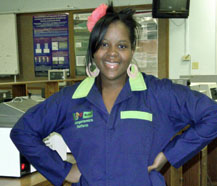 |
Kanesha Gillyard from the USA .
11 September 2012 |
The university and the Spelman College in Atlanta, USA had a joint research venture that ran from June to August 2012. We had the honour of hosting one of the students from Spelman in the Faculty of Natural and Agricultural Sciences. Kanesha Gillyard joined the group from the TIA/UFS Metagenomics Platform in the Department of Microbial, Biochemical and Food Biotechnology.
This was the first time that Kanesha had left Atlanta. This is what she had to say about her trip to Africa:
“I was met with a bright smile and open arms on my first day. The university staff and overall student body have embraced me. Furthermore, the Biotechnology Department has made me feel like I am family. Every day I was given the opportunity to work with a group of people dedicated to their goals, persistent regarding their purpose and fluent in speaking the many dialects of this universal language.
My first week here at the university was like walking into a whole new world.
I have learned many valuable lessons after experiencing life in South Africa for the past two and half months. From adjusting to a new environment and broadening my horizons to becoming trilingual in English, Afrikaans and the new universal language of virtue, I have grown tremendously. Being a “Kovsie” for two months and obtaining an invaluable wealth of knowledge has left me with the confidence of a winner, passion of a dreamer and heart of a nurturer. In essence, this experience has taught me the scientific method to repeat in order to reach for infinity and beyond.”